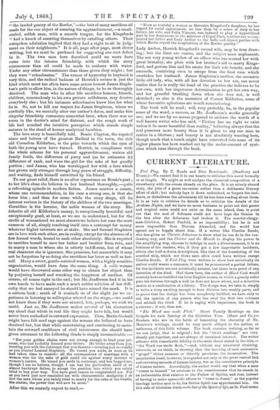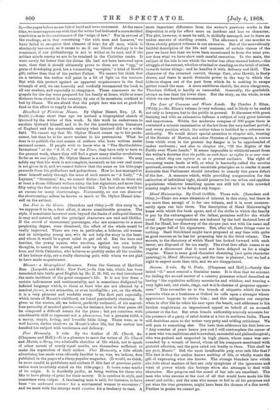"The Word was made Flesh." Short Family Readings on the
Gospels for each Sunday of the Christian Year. (Hunt and Co.)— Readers who are in the habit of lamenting the obscurity of Mr. Maurice's writings, should be very much obliged to the author, or authoress, of this little volume. The book contains nothing, as far as we can judge, that is original ; but the 'short readings" are very clearly put together, and are always of sustained interest. The writer adheres with remarkable fidelity to the main thesis stated in the title,— " the Word was made flesh, "—and, without any unnatural straining, succeeds, as we think, in showing that the teaching of each successive " gospel " either assumes or directly proclaims the incarnation. The incarnation itself, however, is regarded not only as the great central fact and crowning miracle of human history, but as the constitutive principle of human nature. Accordingly, the author would say that when a man "comes to himself" he awakens to the consciousness that he stands in an indissoluble filial relation to the Father of Spirits, and that, instead of having to make spasmodic efforts to "come to Jesus," as the popular theology invites men to do, the Divine Spirit has apprehended him. On this aide of Christian truth,—the law of the Spirit of life, as St. Paul terms
it,—the pages before us are full of lucid and terse statement. At the same time, we must express our wish that the writer had indicated a more decided conviction as to the continuance of the "reign of law." For in several of the readings, as in that concerning "the rich man and Lazarus," we have failed to recognize that element of hope for all men, which is absolutely necessary, as it seems to us, if our liberal theology is to be consistent, if our philanthropy is not to wither at its root and if the noblest minds among us are to be retained in the Christian ranks. It were surely far better that the divine life had not been bestowed upon men, than that it should ultimately prove to them not an "egg," or germ of developing good, but a tormenting "scorpion," a kind of Devil's gift, rather than that of the perfect Father. We cannot but think that on a revision the author will paint in a bit of light on the horizon. But with this protest against an apparent acquiescence in the final triumph of evil, we can honestly and cordially recommend the book to all our readers, and especially to clergymen. These comments on the gospels for the day were prepared for the family at home, while at some distance from church in the country, by one of its members, confined to bed by illness. We are afraid that the pulpit fare was not so good for food as this effort to supply its absence.































 Previous page
Previous page